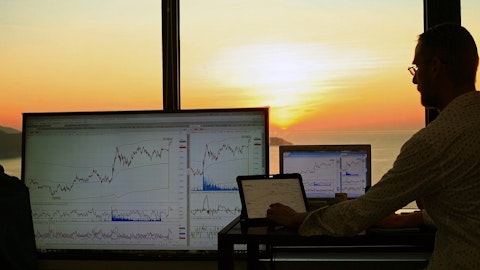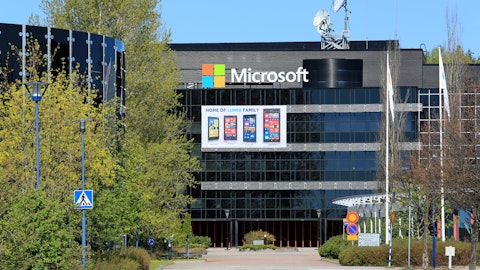In this piece, we will take a look at the ten e commerce stocks billionaires are loading up on. For more stocks, head on over to 5 E-commerce Stocks Billionaires Are Loading Up On.
One of the biggest industries that has grown along with the Internet is electronic commerce. Digital platforms have removed the need for buyers to physically go to markets and inspect products before making a buying decision. Instead, all they have to do is use their smartphone or computer and visit a website to scour through countless products and merchants to make an informed decision.
Naturally, this makes the electronic commerce industry one of the biggest in the world. In fact, along with consumer technology, it is one of the few new sectors that have produced behemoth companies with unprecedented size. For example, Amazon.com, Inc. (NASDAQ:AMZN), the world’s biggest ecommerce company, is one of the few companies in the world that is worth more than a trillion dollars. Its founder Jeff Bezos’s stake in Amazon makes him worth a whopping $147 billion as of June 2023 according to Forbes Magazine – also making him the third richest person in the world. Another billionaire associated with the electronic commerce industry is Jack Ma, the founder of Alibaba Group Holding Limited (NYSE:BABA). Alibaba is worth $250 billion in market capitalization, and Mr. Ma is worth a cool $23.6 billion – enough money to last several lifetimes.
So, what is the electronic commerce industry worth? Well, a research report from Research and Markets outlines that the market was worth a whopping $16.6 trillion in 2022 and, despite this absolutely massive size, it is expected to grow at a stunning compounded annual growth rate (CAGR) of 27.38% between 2022 and 2028 to be worth an unbelievable $70 trillion by the end of the forecast period. The research firm believes that there are a variety of factors that will drive its growth. These include growth in urbanization leading to higher living standards, a younger population more predisposed to use technology in their daily lives, and the simple convenience offered by placing an order online.
At the same time, online retailing or e-commerce isn’t simply related to groceries or merchandise or platforms that carry all kinds of products. In fact, there are several subsets of the market. One of these is the healthcare e-commerce industry. According to estimates from Medgadget, the global healthcare e-commerce market was worth $156 billion in 2018 and is expected to more than double in size until 2025 to sit at an estimated $435.8 billion. Within the market, North America holds the highest market share which stood at 40% in 2018.
Another major e-commerce market is the food and beverages industry. After all, long gone are the days when you had to actually go to a restaurant to buy food. Now, everything is available through numerous applications in the palm of your hand. Taking a look at the monetary value of this market, The Business Research Company believes that this market was worth $46.72 billion in 2021 and is expected to sit at $57 billion by the end of this year after growing at a CAGR of 22.2%. This growth rate is expected to sit at a respectable 17.6% between 2023 and 2026 for a final market value of the food and beverages e-commerce market of $109 billion.
The ecommerce industry is now talking about the next wave coming to the sector. This wave requires expanding focus on the sector and looking at it as more than a ‘bolt on’ extension, believes the consulting firm, McKinsey. McKinsey believes that this requires firms to operate independently of channels and instead create an agnostic experience that is capable of fulfilling the customer’s orders wherever and whenever needed. Another strategy that can enable companies to enhance their e-commerce offering is to ensure that all of the customers’ needs and concerns about a product are addressed instead of just selling the product and then forgetting about it. This particular bit also makes intuitive sense, since while on the one hand e-commerce provides the consumer with the ability to easily sort through all kinds of products, on the other, it does not provide an opportunity to physically inspect or test the goods in order to make a comfortable purchase. This is particularly important since the average return rate for e-commerce products can go as high as 30%.
Finally, in the midst of the current turbulence in the economy, it’s important to look at what the e-commerce firms themselves think is in store for the rest of this year. On this front, the management of Amazon.com, Inc. (NASDAQ:AMZN) shared during the firm’s earnings conference for the first quarter of 2023:
For the first quarter, our worldwide net sales were $127.4 billion, up 9% year-over-year, or 11% excluding approximately 210 basis points of unfavorable impact from changes in foreign exchange rates. This was above the top end of our guidance range. Overall, we are pleased with the growth that we’re seeing in worldwide stores businesses, including quarter-over-quarter revenue acceleration in the International segment, which is helped by easing macroeconomic pressures in Europe. Across the geographies we serve, customers appreciate our focus on staying sharp on pricing, having strong selection and easier convenience, including delivery speeds, which continued to improve throughout the first quarter.
That said, the uncertain economic environment and ongoing inflationary pressures continue to be a factor, and we believe it’s continuing to drive cautious spending across consumers. This means our customers are looking to stretch their budgets further and are focused on value. We saw moderated spending on discretionary categories as well as shifts to lower-priced items and healthy demand in everyday essentials, such as consumables and beauty. Third-party sellers, including businesses who elect to utilize Fulfillment by Amazon for their storage and shipping services are a key contributor to the selection offered to customers. We also continued to invest meaningfully in brand protection efforts, including industry-leading technology, so that sellers can trust we will provide a great selling experience free from bad actors.
So, are there any e-commerce stocks that billionaires are loading up on despite an inflationary environment? Seems to be the case and some top picks are MercadoLibre, Inc. (NASDAQ:MELI), Amazon.com, Inc. (NASDAQ:AMZN), and Alibaba Group Holding Limited (NYSE:BABA).

Photo by CardMapr.nl on Unsplash
Our Methodology
To compile our list of the e-commerce stocks that billionaires are buying, we first made a list of the forty largest e-commerce companies in terms of market capitalization. Then, the number of billionaire-led or founded hedge funds that had bought their shares was determined using Insider Monkey’s database, and billionaires’ top e-commerce stock picks are listed below.
E-commerce Stocks Billionaires Are Loading Up On
10. Etsy, Inc. (NASDAQ:ETSY)
Number of Billionaire Investors in Q1 2023: 8
Etsy, Inc. (NASDAQ:ETSY) is an American firm headquartered in Brooklyn, New York. It primarily operates a platform that enables buyers and sellers to buy and sell artsy products.
After digging through 943 hedge funds for their first quarter of 2023 investments, Insider Monkey discovered that 31 had held a stake in the firm. Etsy, Inc. (NASDAQ:ETSY)’s largest hedge fund investor is John Overdeck and David Siegel’s Two Sigma Advisors with a $226 million investment.
Along with Amazon.com, Inc. (NASDAQ:AMZN), Etsy, Inc. (NASDAQ:ETSY), MercadoLibre, Inc. (NASDAQ:MELI), and Alibaba Group Holding Limited (NYSE:BABA), is an e-commerce stock finding favor with billionaires.
8. Revolve Group, Inc. (NYSE:RVLV)
Number of Billionaire Investors in Q1 2023: 10
Revolve Group, Inc. (NYSE:RVLV) operates an online platform allowing younger consumers to buy fashion products, clothes, decoration accessories, and other products. It was set up in 2003 and is headquartered in Cerritos, California.
By the end of March 2023, 20 of the 943 hedge funds profiled by Insider Monkey had invested in the firm. Revolve Group, Inc. (NYSE:RVLV)’s largest hedge fund investor is billionaire Ken Fisher’s Fisher Asset Management since it owns 2.5 million shares that are worth $66 million.
4. eBay Inc. (NASDAQ:EBAY)
Number of Billionaire Investors in Q1 2023: 14
eBay Inc. (NASDAQ:EBAY) is one of the oldest e-commerce companies in the world. While most other platforms connect merchants with consumers, the company allows anyone with an account to sell anything (legal) that they want.
Insider Monkey’s first quarter of 2023 survey covering 943 hedge funds revealed that 44 had bought and owned the firm’s shares. eBay Inc. (NASDAQ:EBAY)’s largest hedge fund investor in our database is Richard Mashaal’s Rima Senvest Management with a $231 million investment.
7. Sea Limited (NYSE:SE)
Number of Billionaire Investors in Q1 2023: 14
Sea Limited (NYSE:SE) is a Singaporean e-commerce firm. Its platform is called Shopee, and the firm also provides other services such as payments management.
65 of the 943 hedge funds surveyed by Insider Monkey had invested in Sea Limited (NYSE:SE) during Q1 2023. Out of these, the largest shareholder is Jay Chen’s Himension Capital with a $406 million investment.
9. Coupang, Inc. (NYSE:CPNG)
Number of Billionaire Investors in Q1 2023: 15
Coupang, Inc. (NYSE:CPNG) sells a variety of products through its platform. These include personal care, decoration, food, groceries, and electronics. It also allows restaurants to make deliveries to customers. The firm was set up in 2010 and is headquartered in Seattle, Washington.
47 of the 943 hedge funds part of Insider Monkey’s database had bought and owned Coupang, Inc. (NYSE:CPNG)’s shares during 2023’s first quarter. Out of these, the firm’s largest investor is Lee Ainslie’s Maverick Capital with a $1.1 billion investment.
Coupang, Inc. (NYSE:CPNG), JD.com, Inc. (NASDAQ:JD), Amazon.com, Inc. (NASDAQ:AMZN), and Alibaba Group Holding Limited (NYSE:BABA) are some of the hottest e-commerce stocks being bought by billionaires.
Click to continue reading and see the 5 E-commerce Stocks Billionaires Are Loading Up On.
Suggested Articles:
- 10 Best Industrial Distribution Stocks to Buy Now
- 10 Chinese Stocks Billionaires Are Loading Up On
- 15 Stocks that will 10x in 5 Years
Disclosure: None. 10 E-commerce Stocks Billionaires Are Loading Up On is posted on Insider Monkey.





